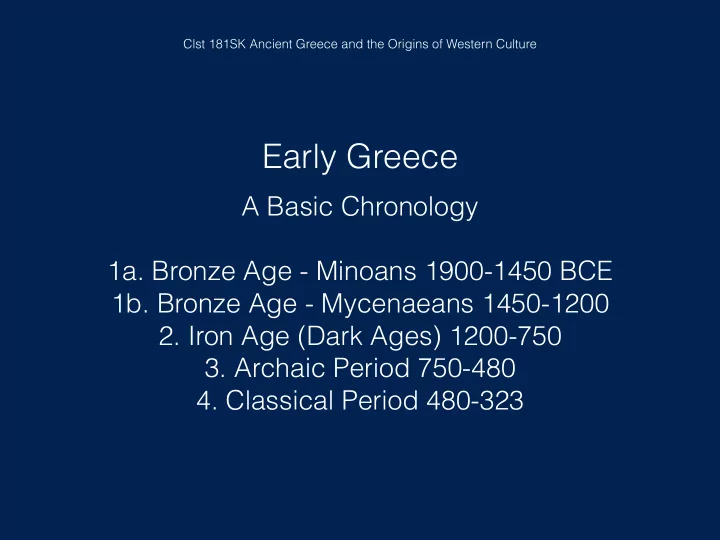

Clst 181SK Ancient Greece and the Origins of Western Culture Early Greece A Basic Chronology � 1a. Bronze Age - Minoans 1900-1450 BCE 1b. Bronze Age - Mycenaeans 1450-1200 2. Iron Age (Dark Ages) 1200-750 3. Archaic Period 750-480 4. Classical Period 480-323 �
1a. Bronze Age Greece - Minoans The Minoan Civilization (1900-1450 BCE) � � Knossos, Crete
1b. Bronze Age Greece - Mycenaeans The Mycenaean Civilization (1450-1200 BCE) Mainland Greece, especially the Peloponnesus Mycenae – Palace Megaron
Mycenae – Demons?
The Bronze Age - Collapse � Greek Palace structures are destroyed in about 1200-1150 BCE � Knossos Mycenae Pylos Thebes Tiryns Troy(!) We do not know how or by whom the devastation occurred - the Greeks told a story of invaders (the “Dorian invasion”)
2. The Greek “Dark Age” - the Iron Age � 1200-750 BCE Lefkandi – Heroön plan
� 2. The Iron Age 1200-750 BCE Early Geometric Vase 850 BCE
Iron Age – Movement to the Archaic Period
Clst 181SK Ancient Greece and the Origins of Western Culture Early Greece A Basic Chronology � 1a. Bronze Age - Minoans 1900-1450 BCE 1b. Bronze Age - Mycenaeans 1450-1200 2. Iron Age (Dark Ages) 1200-750 3. Archaic Period 750-480 4. Classical Period 480-323 �
� 3. The Archaic Period 750-480 BCE 530 BCE 750 BCE 560 BCE 700 BCE 600 BCE
Clst 181SK Ancient Greece and the Origins of Western Culture The Archaic Period 750-480 BCE Background to the “Classical Moment” � �
The Archaic Period Mantiklos Apollo, 700-650 BC
The Archaic Period Mantiklos Apollo, 700-650 BC
The Archaic Period Geometric bronze horse, c. 700 BC
The Archaic Period New York Kouros c. 600 BC
The Archaic Period Mentuemhet, Egypt, 7 th c. Kouros c. 600 BC
The Archaic Period Kleobis & Biton, c. 590 BC
The Archaic Period Calf Bearer Kouros, 560 BC • “Archaic smile”
The Archaic Period Kroisos (Anavysos ) Kouros c. 530 BC • Note original paint
The Archaic Period – Movement to the Classical Cf. Kritios Boy, 480 BC
The Archaic Period Maiden from Auxerre, c. 650 BC
The Archaic Period Phrasikleia Kore, c. 550 BC
The Archaic Period Peplos Kore c. 530 BC
The Archaic Period Maiden of Chios, c. 510 BC
The Archaic Period – Movement to the Classical Cf. Caryatids from the Porch of Maidens, Erechtheion, Acropolis; Stele of Ampharete
A Basic Chronology � 1a. Bronze Age - Minoans 1900-1450 BCE 1b. Bronze Age - Mycenaeans 1450-1200 2. Iron Age (Dark Ages) 1200-750 3. Archaic Period 750-480 4. Classical Period 480-323 �
3. Archaic Period 750-480
480 BCE
480 BCE The Persian War
480 The Persian War
480 The Persian (Achaemenid) Empire
Herodotus “The Father of History” “The History of the Persian Wars” “The History of the Persian Wars”
Herodotus What is “History”?
Herodotus What does it mean to write “History” before “History” has been invented?
Herodotus But what does it mean to “invent” history?
Herodotus History as a formal narrative about the past (the study of such narratives is call historiography )
Herodotus History as a formal narrative about the past • NOT “A COLLECTION OF FACTS ABOUT THE PAST” • NOT “WHAT HAPPENED IN THE PAST” … AT LEAST NOT SIMPLY THAT
Herodotus History as a formal narrative about the past • Story (narrative) • Memorialization • Analysis • Selection • Meaning Herodotus, proem: “presentation to the public,” “researches” = historiê, “time not erase”, “great and marvelous deeds,” “glory” = kleos, “why”, “war/quarrel”
Herodotus The Snatchings of Women IONIA Erythraean Sea
Herodotus The Snatchings of Women Io Europa IONIA Medea Erythraean Sea Helen
Herodotus The Snatchings of Women Io Europa Medea Helen IONIA “The Persians Say” Erythraean Sea “The Greeks Say” “The Phoenicians Say”
Herodotus The Snatchings of Women “The Persians Say” “The Greeks Say” “The Phoenicians Say” Themes: IONIA WEST / EAST Erythraean Sea
Herodotus The Snatchings of Women “The Persians Say” “The Greeks Say” “The Phoenicians Say” Themes: IONIA WEST / EAST Women as objects Erythraean Sea Cause of the quarrel Refusal of ransom
Herodotus The Story of Gyges LYDIA I O N I A Corinth • • Miletus
Herodotus The Story of Gyges H a l y s r i v e r • 1.3s Lydia, Sardis, Ephesus, Miletus. The Maeander River flows just north of Miletus, and the town of Assessus is also in the area near Miletus (Milesia).
Herodotus The Story of Gyges Themes
Recommend
More recommend